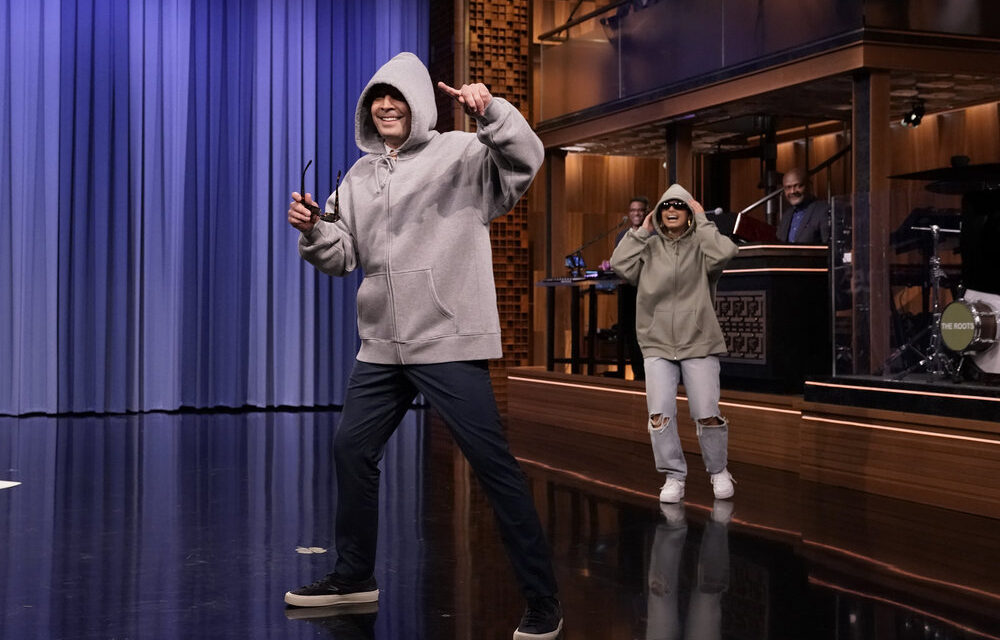Community, Leadership, Experimentation, Diversity, & Education
Pittsburgh Arts, Regional Theatre, New Work, Producing, Copyright, Labor Unions,
New Products, Coping Skills, J-O-Bs...
Theatre industry news, University & School of Drama Announcements, plus occasional course support for
Carnegie Mellon School of Drama Faculty, Staff, Students, and Alumni.
CMU School of Drama
Monday, April 05, 2021
Jimmy Fallon, Addison Rae, and the Issue of TikTok Dance Credit
The Theatre Times: On March 26, 2021, ultra-famous TikTok star Addison Rae Easterling appeared on The Tonight Show Starring Jimmy Fallon. During her visit, she performed popular TikTok dance trends during one of the show’s recurring segments in which (white) TikTokers teach Jimmy Fallon trending dances (mostly) created by Black teens on the increasingly popular social media platform.
Subscribe to:
Post Comments (Atom)

3 comments:
The issue of credit for trends is always something I see going around on TikTok. Tiktok is definitely not made with the intention of giving due credit to an artist. It's very difficult to find people and videos on the app, and if the video that you first find a trend on did not credit the originator, it can be really hard to find the proper person to credit. There are even musicians that make very popular songs that are used as audios, and with the boiling down and re-posting of videos, even those singers sometimes do not get the credit. It is all too often that I find a person I've never seen before posting that they are the singer of a song I've heard 1 million times, and it's honestly kind of sad. I know if my work became suddenly very popular and I was not reaping any benefits from it, I'd be mad. It also says a lot that this is most often an issue with BIPOC creators, and a white person doing the bare minimum gets the acclaim.
Tiktok is a public social media app. No one really owns anything, it’s more like passing a joke onto a friend and them telling it to other people than plagiarizing someone else’s journalism piece. However, the point that the article wants to make is acknowledging how race affects this equation. Executives from TikTok have admitted that they will purposefully suppress content that breaks their community standards, even going as far as detailing that “in order to prevent bullying” the content from disabled people or people of color will be purposefully shown less in other people’s algorithm. With that in mind, I see where the outrage comes from. Things can only be popular when certain creators, leaders, or celebrities make it, if anyone else does it it’s unacceptable, boring even. As a frequenter of the app, I have seen how trends beginning at spaces for marginalized groups have trickled up to the mainstream, only to have them be taken out of the intended context with the people now partaking in it unaware of the history behind it.
This is a surprising comment I’ll find myself writing. As a user of Tik Tok, I’ve seen the outrage about this interview. Personally, I find Addison Rae (and Charli Damelio) terrifyingly mediocre, so any of this attention, I feel, is unnecessary and unwarranted. Even seeing clips of the original creators of the dance side by side with Addison Rae doing them on television… their mediocrity is obvious. “While Addison Rae was promoting her new song (“Obsessed”) and reveling in how TikTok fame can lead to legitimate celebrity status” This quote quite literally sends shivers down my spine. The concept that objectively bad content creators that steal content can consider themselves “legitimate celebrities” is beyond me. As for the specific issue with assigning credit, this is nothing new. (Which is awful.) But white creators that are popular on Tik Tok for dancing very rarely do dances of their own. And usually original creators have to go complaining to their platform and get the the white creator to receive backlash before any actual credit is assigned— far too late after the fact.
Post a Comment